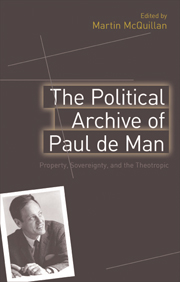Book contents
- Frontmatter
- Contents
- List of Abbreviations
- Acknowledgements
- Notes on Contributors
- Introduction: Broken Promises: Rousseau, de Man and Watergate
- 1 Lovence in Rousseau's Julie ou la Nouvelle Héloïse
- 2 Reading Spectacles in Rousseau's Letter to d'Alembert
- 3 The Utter Misery of the Human Mind: Apotropaic and Theotropic in de Man's Rousseau
- 4 Rhetoric and Rausch: de Man on Nietzsche on Value and Style
- 5 Theotropic Logology: J. Hillis Miller, Paul de Man and Kenneth Burke
- 6 Normativity, Materiality and Inequality: The Politics of the Letter in Paul de Man
- 7 Inscribing the Political: Paul de Man and the Wild Art of Letter Writing
- 8 Mistake in Paul de Man: Violent Reading and Theotropic Violence
- 9 Lightstruck: ‘Hegel on the Sublime’
- 10 De Man vs. ‘Deconstruction’: or, Who, Today, Speaks for the Anthropocene?
- 11 Paul de Man at Work: What Good is an Archive?
- 12 DNA: de Man's Nucleic Archive
- 13 Sovereign Debt Crisis: Paul de Man and the Privatization of Thought
- Appendix: Nietzsche I: Rhetoric + Metaphysics
- Index
9 - Lightstruck: ‘Hegel on the Sublime’
Published online by Cambridge University Press: 05 August 2013
- Frontmatter
- Contents
- List of Abbreviations
- Acknowledgements
- Notes on Contributors
- Introduction: Broken Promises: Rousseau, de Man and Watergate
- 1 Lovence in Rousseau's Julie ou la Nouvelle Héloïse
- 2 Reading Spectacles in Rousseau's Letter to d'Alembert
- 3 The Utter Misery of the Human Mind: Apotropaic and Theotropic in de Man's Rousseau
- 4 Rhetoric and Rausch: de Man on Nietzsche on Value and Style
- 5 Theotropic Logology: J. Hillis Miller, Paul de Man and Kenneth Burke
- 6 Normativity, Materiality and Inequality: The Politics of the Letter in Paul de Man
- 7 Inscribing the Political: Paul de Man and the Wild Art of Letter Writing
- 8 Mistake in Paul de Man: Violent Reading and Theotropic Violence
- 9 Lightstruck: ‘Hegel on the Sublime’
- 10 De Man vs. ‘Deconstruction’: or, Who, Today, Speaks for the Anthropocene?
- 11 Paul de Man at Work: What Good is an Archive?
- 12 DNA: de Man's Nucleic Archive
- 13 Sovereign Debt Crisis: Paul de Man and the Privatization of Thought
- Appendix: Nietzsche I: Rhetoric + Metaphysics
- Index
Summary
On the final examination of my undergraduate literary theory course I sometimes include a short ID for extra credit: ‘/i/ or /u/’. It's from a moment in Roman Jakobson's ‘Linguistics and Poetics’ when he claims that ‘Sound symbolism is an undeniably objective relation founded on a phenomenal connection between the visual and auditory experience.’ If results of research in this area have been vague or controversial, says Jakobson, ‘it is primarily due to an insufficient care for the methods of psychological and/or linguistic inquiry’. According to Jakobson, a proper attention to the phonological aspect of speech sounds – in particular, to their ultimate components, i.e., phonemes – will confirm such ‘sound symbolism’: ‘when, on testing, for example, such phonemic oppositions as grave versus acute we ask whether /i/ or /u/ is darker, some of the subjects may respond that this question makes no sense to them, but hardly one will state that /i/ is the darker of the two’. So: if hardly anyone will state that /i/ is the darker of the two, then it is as clear as day that /u/ must be darker and /i/ must be lighter. Although poetry ‘is not the only area where sound symbolism makes itself felt’, says Jakobson, ‘it is a province where the internal nexus between sound and meaning changes from latent to patent and manifests itself most palpably and intensely’. The Russian language - which has /d,en,/ for ‘day’ and /nocí/ for ‘night’ – seems to agree with Jakobson's claim, but French, as Mallarmé already noted, is rather perverse since in ‘jour’ and ‘nuit’ the distribution of grave and acute vowels is inverted.
- Type
- Chapter
- Information
- The Political Archive of Paul de ManProperty, Sovereignty and the Theotropic, pp. 118 - 130Publisher: Edinburgh University PressPrint publication year: 2012



